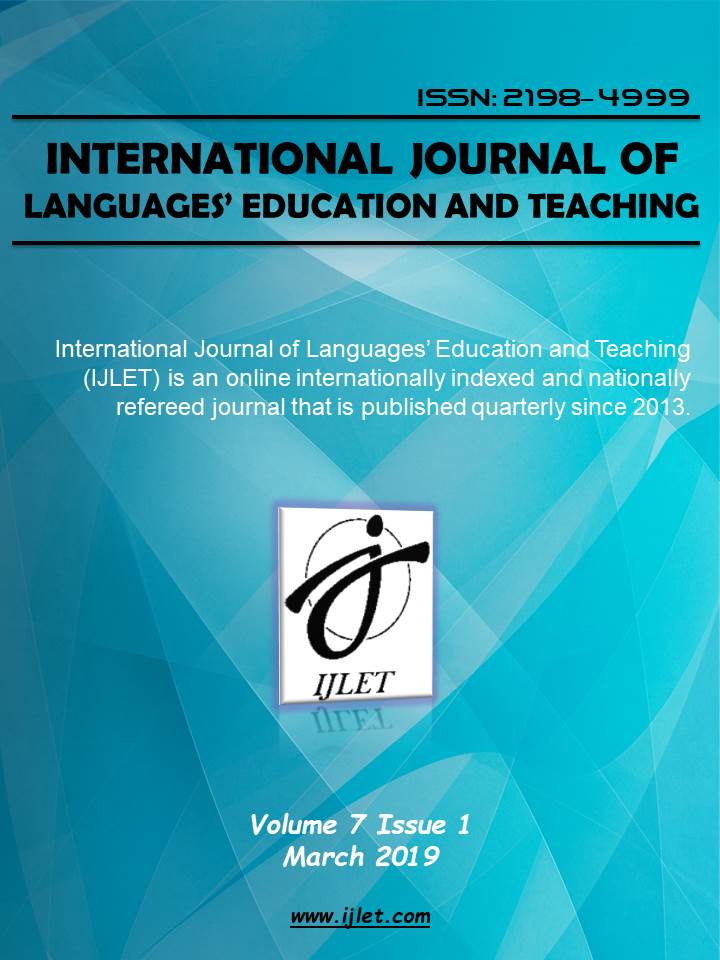An Investigation on the Sociolinguistic Competence of English Language Teacher Trainees: A Comparative Study on Native and Non-Native English Speakers
Author :
Abstract
Keywords
Abstract
The aim of the present study was to investigate sociolinguistic abilities of Turkish senior students of ELT departments in comparison to native speakers of English. Fifty Turkish and twenty-five American students participated in the study. The study was carried out in two aspects: (1) The differences of refusal and complaint strategies and (2) how their performances were perceived by a native interlocutor for the same social situations with two variables of interlocutors: higher – equal, familiar – unfamiliar. The data were collected qualitatively and quantitatively by means of two tools; a DCT involving 6-paired situations with two interlocutors, in total 12 items, separated as 3 refusal and 3 complaint situations was used for the qualitative analysis. The responses of all participants for each pair were coded, analysed and compared in SPSS program. Quantitative analysis was done by a communicative rating scale. An American rater graded Turkish students’ responses according to the 5-point scale to assess their performances in sociocultural and sociolinguistic criteria. The results showed that Turkish EFL learners could use a range of speech act strategies, but they deviate from native speakers in content. Also, it was seen that they lacked some sociolinguistic and sociocultural knowledge that might cause sociopragmatic failure.
Keywords
- Akinci-Akkurt, P.(2007). A case study on assessing pragmatic awareness of turkish efl learners via speech act
- Akinci-Akkurt, P.(2007). A case study on assessing pragmatic awareness of turkish efl learners via speech actset of complaints: a cross-cultural pragmatic perspective. Unpublished Master’s Thesis. Gazi University, Ankara.
- Bardovi-Harlig, K.&Dörnyei, Z. (1998). Do language learners recognize pragmatic violations? pragmatic vs. grammatical awareness in instructed l2 learning. TESOL Quarterly. 32, 233–259
- Beebe, L. M., Takahashi, T., & Uliss-Weltz, R. (1990). Pragmatic transfer in ESL refusals. In R. C.Scarcella, E. Andersen, & S. D. Krashen (Eds.). Developing Communicative Competence in a Second Language (55-73). New York: Newbury House.
- Bikmen, A. S. (2011). A descriptive study on the performance of complaints by Turkish university students in an efl context. Unpublished Master’s Thesis. Bogazici Universitesi, Ankara
- Billmyer, K. (1990). "I really like your lifestyle": ESL learners learning how to compliment. Penn Working Papers in Educational Linguistics, 6(2), 31-48.
- Blum-Kulka, S. (1982). Learning how to say what you mean in a second language: a study of the speech act performance of learners of Hebrew as a second language. Applied Linguistics, 3, 29–59.
- Blum-Kulka, S., House, J., & Kasper, G. (Eds.) (1989). Cross-cultural pragmatics: requests and apologies. Norwood: Ablex Publishing Corporation.
- Bonikowska, M.P. (1988). The choice of opting out. Applied Linguistics, 9, 168-181.
- Brown, P. and Levinson, S. D. (1987) Politeness: some universals in language usage. Cambridge: Cambridge University Press.
- Chang, Y. F. (2010). ‘‘I no say you say is boring’’: The development of pragmatic competence in l2 apology. Language Sciences 32, 408–424
- Cimen, S. S. (2009). Cross-linguistic and cross-subject investigation of speech acts of refusals. Unpublished Master’s Thesis, Mugla University, Mugla.
- Cohen, A. D. (1994). Assessing language ability in the classroom. Boston, MA: Heinle & Heinle
- Cohen, A. & Olshtain, E. (1981). Developing a measure of sociocultural competence: the case of apology. Language Learning 31 (1), 113–134.
- Cohen, A.D., & Olshtain, E. (1983). Apology: a speech act set. In N. Wolfson & E. Judd (Eds.), Sociolinguistics and Language Acquisition (pp. 18-35). Rowley: Newbury House Publishers.
- Deveci, T. (2010). The use of complaints in the inter-language of Turkish EFL learners. Colombia Applied Linguistics Journal, 12 (2), 25-42
- Doganay-Aktuna, S. & Kamisli, S. (1997). Pragmatic transfer in Interlanguage development: a case study of advanced EFL learners. Distributed by ERIC Clearinghouse.
- Eisenstein, M., & Bodman, J. (1993). Expressing gratitude in American English. In G. Kasper & S. Blum-Kulka (Eds.), Interlanguage pragmatics (pp. 64-81). New York: Oxford University Press.
- Harley, B., Cummins, J., Swain, M. & Allen, P. (1990). The nature of language proficiency. In B. Harley,P. Allen, J. Cummins & M. Swain (Eds) The Development of Second Language Proficiency. New York: Cambridge University Press
- House, J. & Kasper, G. (1981). Politeness markers in English and German. In F. Coulmas (Ed.),Conversational Routine: Exploration in Standardized Communication Situations and Prepatterned Speech (pp. 157 -185). The Hauge: Mouton de Gruyter.
- Kasper, G., & Dahl, M. (1991). Research methods in interlanguage pragmatics. Studies in Second Language Acquisition 13, 215-247
- Kasper, G., & Schmidt, R. (1996). Developmental issues in Interlanguage pragmatics. Studies in Second Language Acquisition, 18, 149-169.
- Kilickaya, F. (2010). The Pragmatic knowledge of Turkish EFL students in using certain request strategies. Gaziantep Üniversitesi Sosyal Bilimler Dergisi 9 (1): 185 - 201 ISSN: 1303-0094
- Matsumura, S. (2007). Exploring the after effects of study abroad on interlanguage pragmatic development. Intercultural Pragmatics 4 (2), 167–192.
- Muniandy, M. K. (2010). Sociolinguistic competence and Malaysian students’ English language proficiency. English Language Teaching, Canadian Center of Science and Education, 3 (3), 145-151
- Olshtain, E. and Weinbach, L. (1993). Interlanguage features of the speech act of complaining. In G.Kasper & S. Blum-Kulka (Eds.), Interlanguage Pragmatics (pp. 108-122). New York: Oxford University Press.
- Onalan, O. (2009). A comparative study of formal complaints by native speakers and Turkish learners of English. Unpublished Master’s Thesis. Gazi University, Ankara
- Takahashi, T. & Beebe L.M. (1987). The development of pragmatic competence by Japanese learners of English. JALT Journal 8, 131-155.
- Tarone, E., & Swain, M. (1995). A sociolinguistic perspective on l2 use in immersion classrooms. The Modern Language Journal, 79(2), 166-178.
- Thomas. J. (1983). Cross-cultural pragmatic failure. Applied Linguistics, 4(2), 91-112.
- Trosborg, A. (1995). Interlanguage pragmatics: requests, complaints and apologies. Berlin: Mouton de Gruyter
- Wolfson, N. (1989). Perspectives: Sociolinguistics and TESOL. New York: Newbury House.
